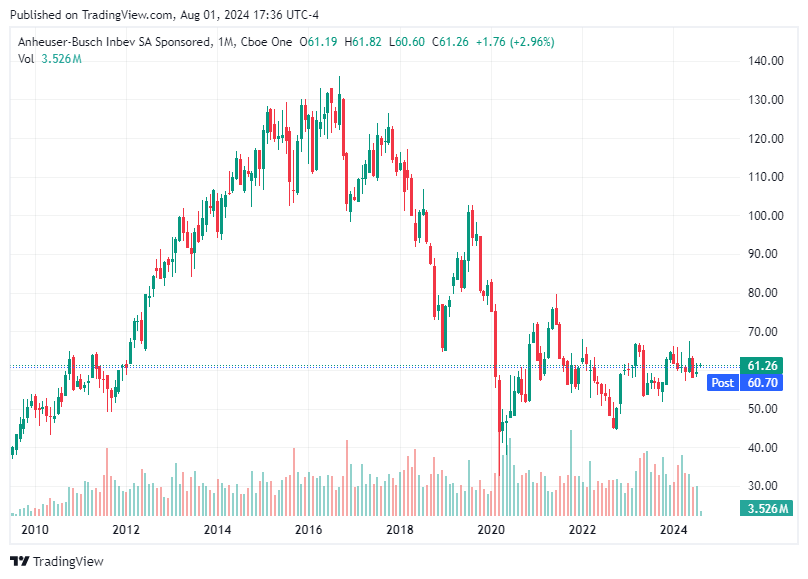Anheuser-Busch Beer Sales Drop Over China Market Decline: U.S. Boycott
AB InBev Beer Sales Decline Amid China Market Weakness and U.S. Boycott.

Disclaimer: This article is intended for informational purposes only and does not constitute financial or investment advice. The information contained herein is based on publicly available data and should be independently verified before making any investment decisions.
Real-time information is available daily at https://stockregion.net
Anheuser-Busch InBev, the world's largest brewer, reported a decline in beer sales for the second quarter of 2024. The company attributed this slump to weaker demand in China and the ongoing impact of a boycott of its Bud Light brand in the United States.
Financial Performance Overview
On Thursday, AB InBev announced its second-quarter earnings, revealing underlying earnings figures that surpassed analyst expectations. However, the company's revenue growth did not meet forecasts, largely due to challenges in the Chinese and Argentine markets. Despite higher profitability, the company's organic sales volumes dropped by 0.8% compared to the same period last year. This was more than the consensus estimate of a 0.6% decline. Notably, this marks the fifth consecutive quarter of organic volume decline for AB InBev.
China's economic landscape has been fraught with uncertainty, affecting various Western businesses, including AB InBev. The brewer noted that the industry experienced a weak start to the year in China. This downturn has been reflected across different sectors, with companies ranging from automakers to luxury goods firms reporting similar challenges. Adding to the woes, Dutch brewer Heineken recently reported weaker-than-expected earnings for the same period and wrote down the value of a substantial investment in China.
AB InBev saw a 10% decline in volumes in China during the second quarter, driven by weaker demand and unfavorable weather conditions. This resulted in a 7.6% drop in sales for the Asia-Pacific region. The broader economic uncertainty in China continues to pose a challenge for Western businesses operating in the region. Argentina also emerged as a problematic market for AB InBev. The country is grappling with soaring inflation, which has put pressure on beer consumption. The difficult economic conditions led to a steeper-than-expected decline in sales volumes, further dampening the company's revenue growth prospects.
The U.S. Boycott Fallout
The situation in the United States has been particularly complex for AB InBev. The company faced a boycott of its Bud Light brand, which began in April 2023. The boycott was sparked when transgender influencer Dylan Mulvaney posted an Instagram video featuring a personalized Bud Light can she received as a gift. This social media post led to backlash and a sustained boycott campaign against the brand.
The repercussions of the boycott have been profound. Bud Light, once the top-selling beer in the U.S., has lost its leading position to competitors like Modelo Especial and Michelob Ultra. Even a surprise endorsement from former President Donald Trump could not reverse the brand's fortunes. The boycott has affected AB InBev's market share in North America, where the company reported a 3.2% decline in sales volumes. In addition to the boycott, AB InBev—and the beer industry at large—faces changing consumer preferences. Many consumers, particularly in the U.S., are shifting from beer to wine and spirits or opting to reduce their alcohol consumption altogether for health reasons. This trend poses an ongoing challenge for brewers who must adapt to evolving market dynamics.
To counteract these shifts, AB InBev has focused on diversifying its product portfolio. The company has invested in premium products and explored opportunities beyond traditional beer offerings. While these efforts have helped mitigate some of the adverse effects, the overall market environment remains challenging.
Cost Control and Profitability
Despite the decline in sales volumes, AB InBev has managed to enhance its profitability through stringent cost control measures. The company's normalized earnings before interest, taxes, depreciation, and amortization (EBITDA) rose by 10% to $5.30 billion. This increase outpaced analysts' expectations of an 8.3% rise. The improvements in profitability were driven by lower finance costs, thanks to reduced losses on derivative contracts.
Following the earnings announcement, AB InBev's shares traded 2.2% higher in European morning trade. Investors reacted positively to the company's robust profitability and effective cost management. However, the missed revenue growth expectations and ongoing market challenges remain areas of concern. AB InBev maintains a medium-term outlook of 4% to 8% growth in EBITDA for 2024. The company expects to navigate the headwinds by continuing to focus on premium products, enhancing operational efficiencies, and exploring opportunities beyond beer.
AB InBev's second-quarter performance highlights the multifaceted challenges the company faces in the current global economic landscape. Weaker demand in China, economic instability in Argentina, and the U.S. boycott of Bud Light have collectively contributed to a decline in sales volumes. However, the company's focus on cost control and diversification into premium products has helped sustain profitability.
As the world's largest brewer, AB InBev's ability to adapt to changing market conditions and consumer preferences will be crucial in maintaining its market position. The ongoing economic uncertainties in key markets such as China and Argentina, coupled with shifts in consumer behavior, reveals the importance of strategic agility in navigating these turbulent times.
Disclaimer: This article is intended for informational purposes only and does not constitute financial or investment advice. The information contained herein is based on publicly available data and should be independently verified before making any investment decisions.
Real-time information is available daily at https://stockregion.net


